.
LocalStack

A local AWS cloud stack for development and testing
🚀 About
In this HashiQube DevOps lab, you'll get hands-on experience with LocalStack and Terraform.
LocalStack provides an easy-to-use test/mocking framework for developing cloud applications. It spins up a testing environment on your local machine that provides the same functionality and APIs as the real AWS cloud environment, allowing you to develop and test your cloud applications without incurring AWS costs.
📋 Provision
vagrant up --provision-with basetools,localstack,terraformdocker compose exec hashiqube /bin/bash
bash hashiqube/basetools.sh
bash docker/docker.sh
bash docsify/docsify.sh
bash localstack/localstack.sh
bash terraform/terraform.sh🛠️ Using Terraform with LocalStack
Terraform Plan
To perform a Terraform plan:
Change directory to the LocalStack directory:
cd /vagrant/localstackInitialize Terraform and run the plan:
terraform init terraform plan
Terraform Apply
To apply your Terraform configuration:
Change directory to the LocalStack directory:
cd /vagrant/localstackInitialize Terraform, run a plan, and apply the changes:
terraform init terraform plan terraform apply
🔄 Terraform and Vault Integration
Terraform has many providers, and you can use it to create resources across various platforms like GitHub, AWS, Azure, Cloudflare, and many others. You can also manage HashiCorp Vault with Terraform.
Setting Up Terraform with Vault
Get Terraform and LocalStack running:
- GitHub Codespace:
bash localstack/localstack.sh - Vagrant:
vagrant up --provision-with basetools,localstack
- GitHub Codespace:
Bring Vault up:
- GitHub Codespace:
bash vault/vault.sh - Vagrant:
vagrant up --provision-with basetools,vault
- GitHub Codespace:
Run Terraform plan with the Vault module enabled:
VAULT_TOKEN="YOUR_VAULT_TOKEN" TF_VAR_vault_enabled=true terraform planExample output:
# module.hashicorp-vault[0].vault_kv_secret_v2.example will be created + resource "vault_kv_secret_v2" "example" { + cas = 1 + data = (sensitive value) + data_json = (sensitive value) + delete_all_versions = true + disable_read = false + id = (known after apply) + metadata = (known after apply) + mount = "kvv2" + name = "secret" + path = (known after apply) + custom_metadata { + data = { + "bar" = "12345" + "foo" = "[email protected]" } + max_versions = 5 } } # module.hashicorp-vault[0].vault_mount.kvv2 will be created + resource "vault_mount" "kvv2" { + accessor = (known after apply) + audit_non_hmac_request_keys = (known after apply) + audit_non_hmac_response_keys = (known after apply) + default_lease_ttl_seconds = (known after apply) + description = "KV Version 2 secret engine mount" + external_entropy_access = false + id = (known after apply) + max_lease_ttl_seconds = (known after apply) + options = { + "version" = "2" } + path = "kvv2" + seal_wrap = (known after apply) + type = "kv" }Run Terraform apply with the Vault module enabled:
VAULT_TOKEN="YOUR_VAULT_TOKEN" TF_VAR_vault_enabled=true terraform applyExample output:
module.hashicorp-vault[0].vault_mount.kvv2: Creation complete after 1s [id=kvv2] module.hashicorp-vault[0].vault_kv_secret_v2.example: Creating... module.hashicorp-vault[0].vault_kv_secret_v2.example: Creation complete after 0s [id=kvv2/data/secret]Access Vault to see the secret engine enabled:
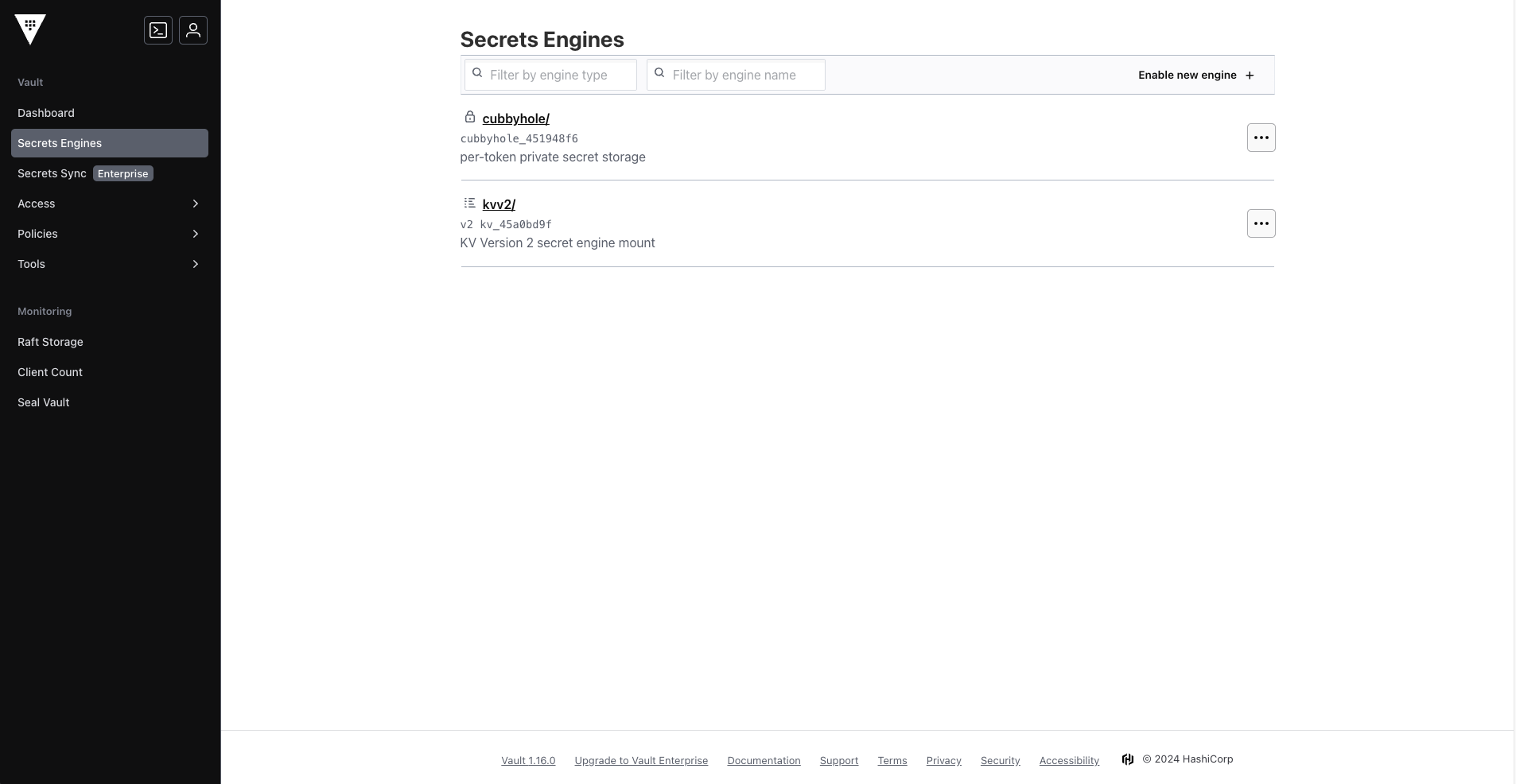
KV2 secret engine enabled in Vault
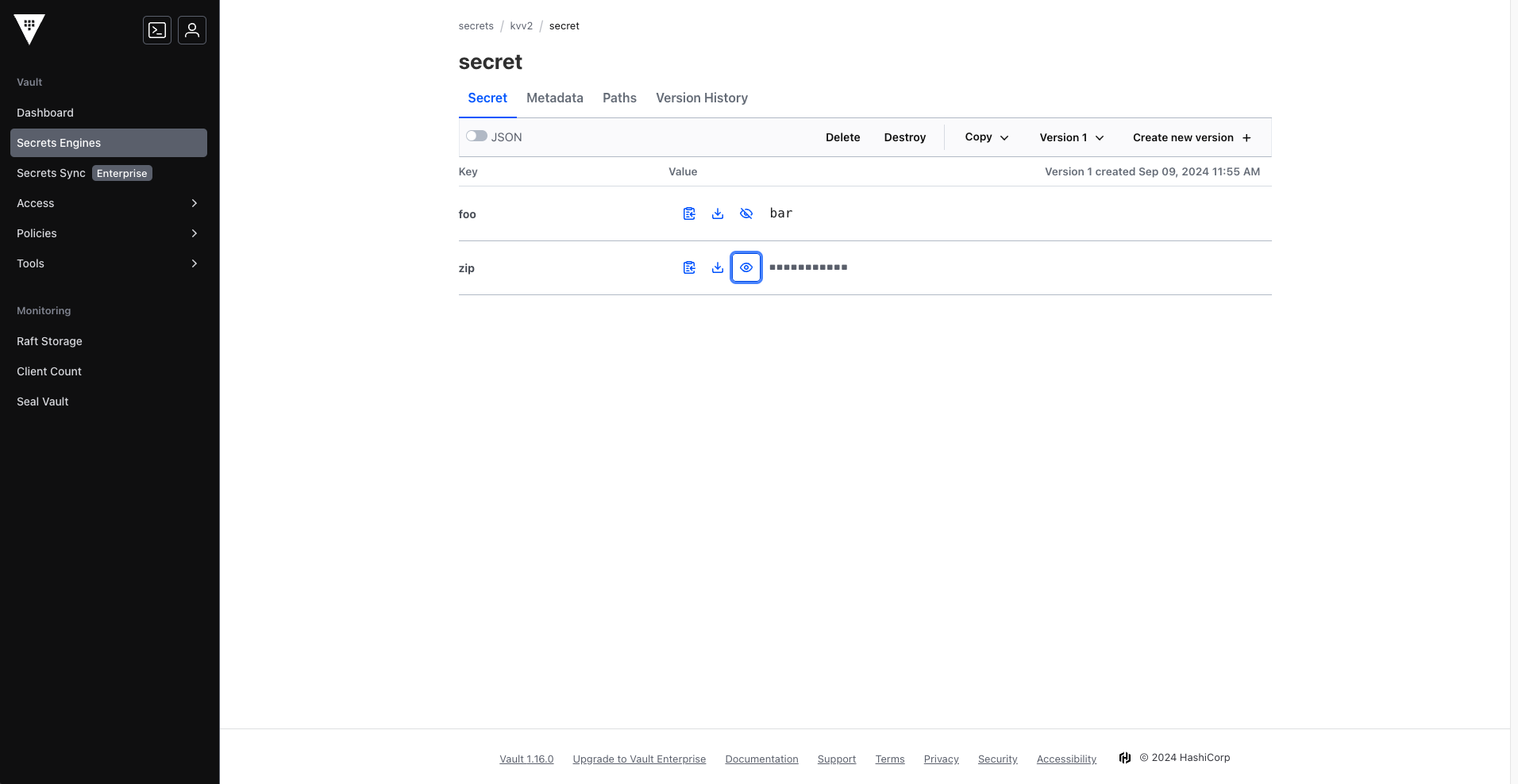
Secrets stored in the KV2 secret engine
For further details, look at the code in /vagrant/localstack:
# modules.tf
module "hashicorp-vault" {
source = "../modules/vault-kv-secret"
count = var.vault_enabled ? 1 : 0
}🌐 LocalStack Web Interface
After running the provisioner, you can create an account at LocalStack Cloud to view your resources.
Creating a LocalStack Account
- Go to https://www.localstack.cloud/ and register, or sign up directly at https://app.localstack.cloud/sign-up
- You can register using SSO with GitHub credentials
Once logged in, you'll see the LocalStack Dashboard:
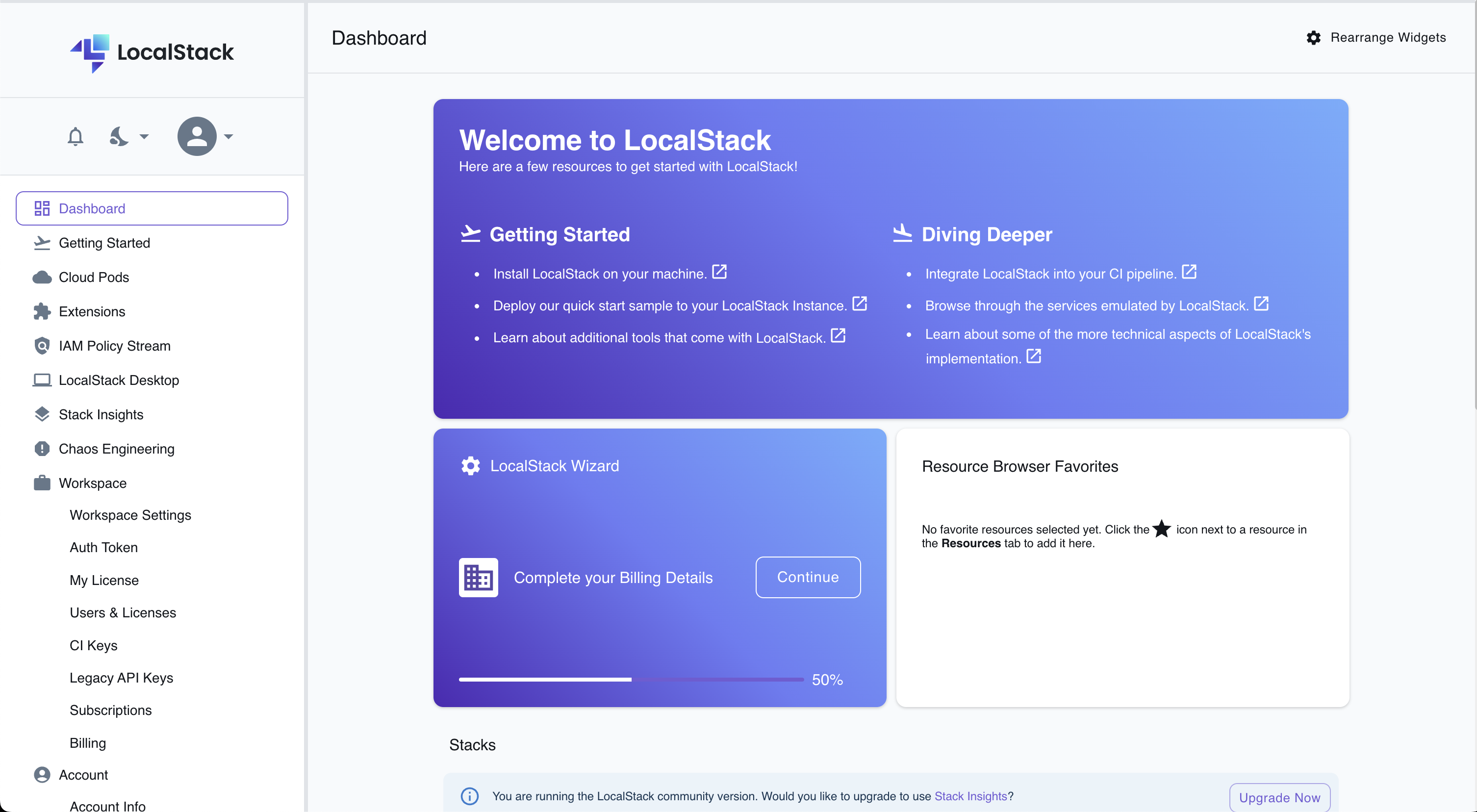
LocalStack Cloud dashboard
Viewing LocalStack Instances
Scroll down in the left-hand menu to see your running instances:
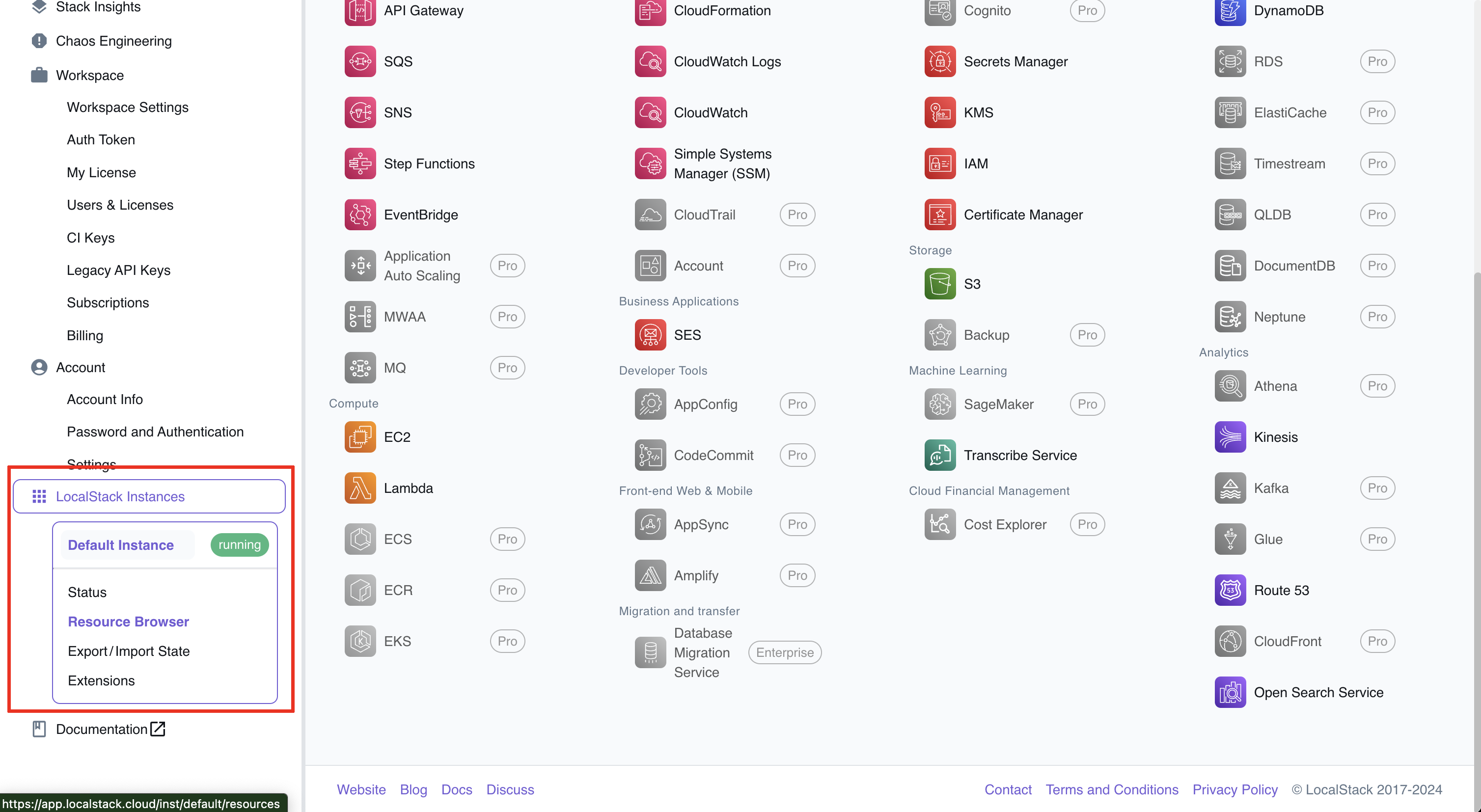
LocalStack running instances
If you click on S3, you'll see the bucket created by Terraform:
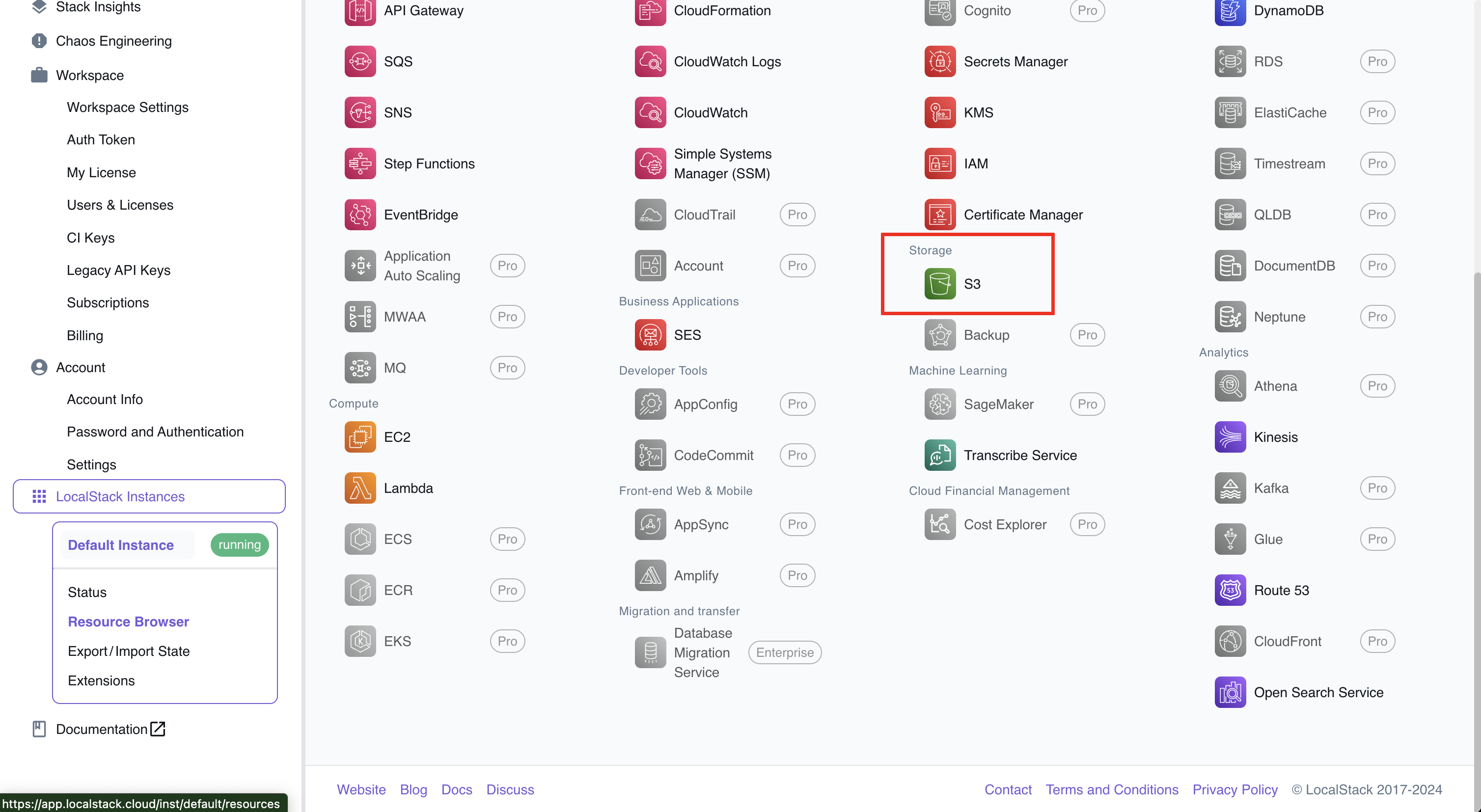
S3 service in LocalStack
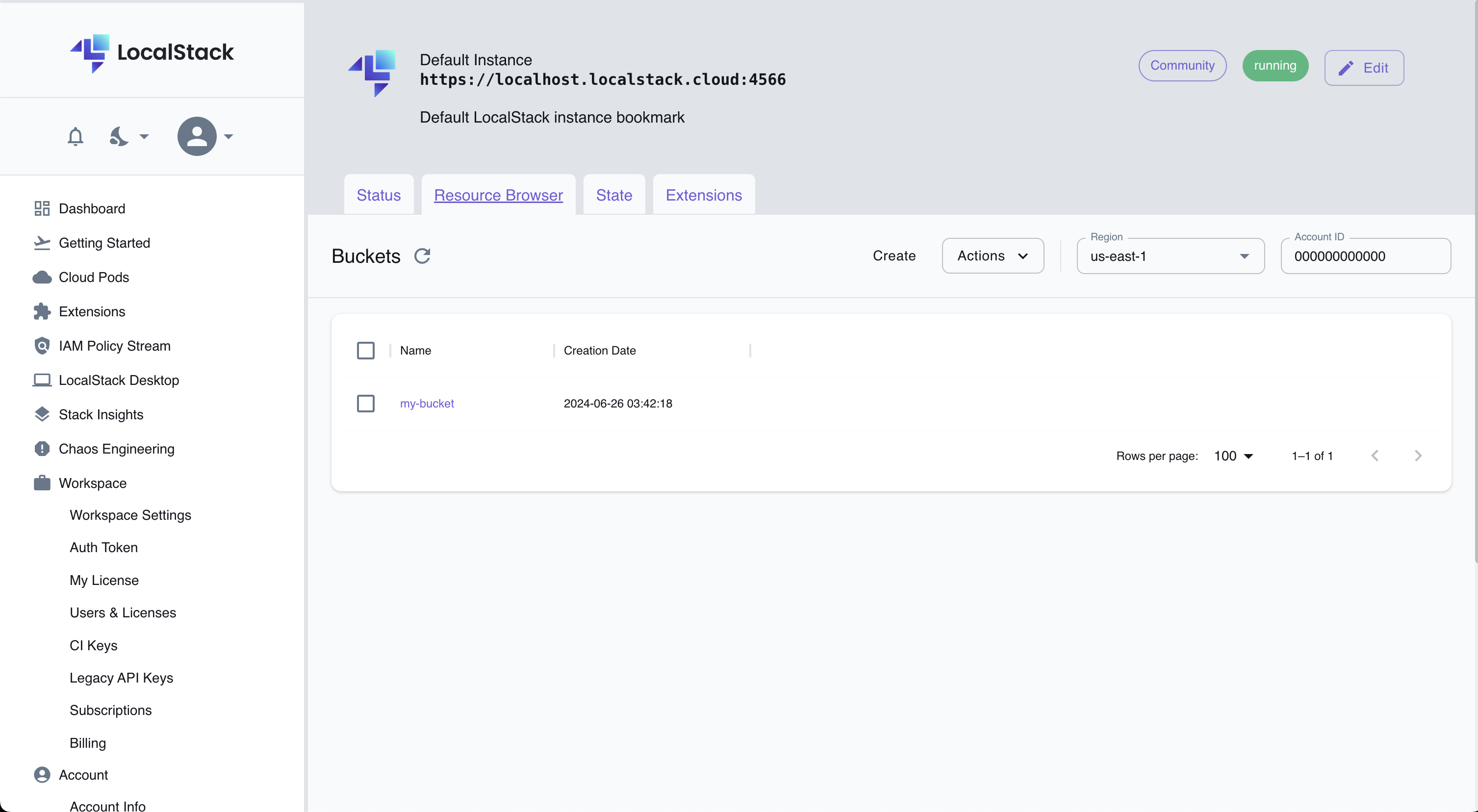
S3 bucket details
💻 Running Terraform Locally
You can also run Terraform commands on your local machine:
Install Terraform on your laptop:
- Follow the instructions at https://developer.hashicorp.com/terraform/tutorials/aws-get-started/install-cli
Verify Terraform is installed:
terraform -versionExample output:
Terraform v1.5.7 on darwin_arm64 + provider registry.terraform.io/hashicorp/aws v5.55.0 + provider registry.terraform.io/hashicorp/null v3.2.2 + provider registry.terraform.io/hashicorp/random v3.6.2 Your version of Terraform is out of date! The latest version is 1.8.5. You can update by downloading from https://www.terraform.io/downloads.htmlNavigate to the LocalStack directory:
cd localstack pwdOutput:
/Users/riaan/workspace/personal/hashiqube/localstackInitialize Terraform:
terraform initOutput:
Initializing the backend...
Initializing provider plugins...
- Checking for available provider plugins...
- Downloading plugin for provider "aws" (hashicorp/aws) 2.33.0...
The following providers do not have any version constraints in configuration,
so the latest version was installed.
To prevent automatic upgrades to new major versions that may contain breaking
changes, it is recommended to add version = "..." constraints to the
corresponding provider blocks in configuration, with the constraint strings
suggested below.
* provider.aws: version = "~> 2.33"
Terraform has been successfully initialized!
You may now begin working with Terraform. Try running "terraform plan" to see
any changes that are required for your infrastructure. All Terraform commands
should now work.
If you ever set or change modules or backend configuration for Terraform,
rerun this command to reinitialize your working directory. If you forget, other
commands will detect it and remind you to do so if necessary.Run Terraform plan:
terraform planApply the Terraform configuration:
terraform applyVerify resources in LocalStack:
vagrant ssh -c "awslocal s3 ls"Output:
2024-06-25 17:42:18 my-bucket
📚 Further Learning
Thanks to the folks at LocalStack for publishing examples for learning Terraform. You can explore more examples from their GitHub repository:
Clone the samples repository:
git clone [email protected]:localstack-samples/localstack-terraform-samples.git cd localstack-terraform-samplesTry the
demo-deployexample:cd demo-deploy cp ../../provider.tf .Initialize and apply the configuration:
terraform init terraform plan terraform apply
🌐 Provision HashiQube on AWS, GCP, or Azure
HashiQube is a DevOps lab that runs all the HashiCorp products and popular Open Source Integrations. It can also help you learn Terraform!
Head over to the HashiQube Cloud Tutorial to learn more.
🔧 LocalStack Terraform Examples
Here are some example Terraform configuration files for LocalStack:
variables.tf
variable "vault_enabled" {
description = "Enable the vault module"
type = bool
default = false
}main.tf
provider "aws" {
region = "us-east-1"
access_key = "mock_access_key"
secret_key = "mock_secret_key"
skip_credentials_validation = true
skip_metadata_api_check = true
skip_requesting_account_id = true
endpoints {
apigateway = "http://localhost:4566"
cloudformation = "http://localhost:4566"
cloudwatch = "http://localhost:4566"
dynamodb = "http://localhost:4566"
es = "http://localhost:4566"
firehose = "http://localhost:4566"
iam = "http://localhost:4566"
kinesis = "http://localhost:4566"
lambda = "http://localhost:4566"
route53 = "http://localhost:4566"
redshift = "http://localhost:4566"
s3 = "http://localhost:4566"
secretsmanager = "http://localhost:4566"
ses = "http://localhost:4566"
sns = "http://localhost:4566"
sqs = "http://localhost:4566"
ssm = "http://localhost:4566"
stepfunctions = "http://localhost:4566"
sts = "http://localhost:4566"
}
}
resource "aws_s3_bucket" "localstack-s3-bucket" {
bucket = "localstack-s3-bucket"
acl = "public-read"
}outputs.tf
output "s3_bucket_name" {
value = aws_s3_bucket.localstack-s3-bucket.bucket
}🔗 Additional Resources
- LocalStack Official Website
- LocalStack Terraform Samples
- LocalStack Pro Samples
- Terraform AWS Provider - Custom Service Endpoints
- Terraform Documentation
- LocalStack GitHub Repository
- AWS CLI Local
#!/bin/bash
# https://docs.localstack.cloud/get-started/
sudo usermod -aG docker vagrant
export PATH=$PATH:/root/.local/bin
arch=$(lscpu | grep "Architecture" | awk '{print $NF}')
if [[ $arch == x86_64* ]]; then
ARCH="amd64"
elif [[ $arch == aarch64 ]]; then
ARCH="arm64"
fi
echo -e '\e[38;5;198m'"++++ "
echo -e '\e[38;5;198m'"++++ CPU is $ARCH"
echo -e '\e[38;5;198m'"++++ "
echo -e '\e[38;5;198m'"++++ "
echo -e '\e[38;5;198m'"++++ Ensure Docker Daemon is running (Dependency)"
echo -e '\e[38;5;198m'"++++ "
if pgrep -x "dockerd" >/dev/null
then
echo -e '\e[38;5;198m'"++++ Docker is running"
else
echo -e '\e[38;5;198m'"++++ Ensure Docker is running.."
sudo bash /vagrant/docker/docker.sh
fi
echo -e '\e[38;5;198m'"++++ "
echo -e '\e[38;5;198m'"++++ Ensure Terraform is installed (Dependency)"
echo -e '\e[38;5;198m'"++++ "
if [[ ! -f /usr/local/bin/terraform ]];
then
echo -e '\e[38;5;198m'"++++ Terraform is not installed, installing"
sudo bash /vagrant/terraform/terraform.sh
else
echo -e '\e[38;5;198m'"++++ Terraform is installed"
fi
echo -e '\e[38;5;198m'"++++ "
echo -e '\e[38;5;198m'"++++ Bring up Localstack"
echo -e '\e[38;5;198m'"++++ "
pip3 install --upgrade awscli-local --break-system-packages
sudo rm -rf awscliv2.zip
# https://aws.amazon.com/blogs/developer/aws-cli-v2-now-available-for-linux-arm/ aarch64
curl -s "https://awscli.amazonaws.com/awscli-exe-linux-${arch}.zip" -o "awscliv2.zip"
sudo rm -rf aws
sudo unzip -q awscliv2.zip
yes | sudo ./aws/install --update
echo -e '\e[38;5;198m'"aws --version"
aws --version
python3 -m pip install awscli-local --break-system-packages --quiet
python3 -m pip install flask-cors --break-system-packages --quiet
sudo -E docker stop localstack_main
yes | sudo docker system prune --volumes
sudo docker run --rm -it -d -p 4566:4566 -p 4571:4571 --rm --privileged --name localstack_main localstack/localstack
sudo docker ps | grep localstack
echo -e '\e[38;5;198m'"++++ "
echo -e '\e[38;5;198m'"++++ Running Terraform Init, Plan and Apply in Localstack directory"
echo -e '\e[38;5;198m'"++++ "
cd /vagrant/localstack/
export PATH=$HOME/.local/bin:$PATH
echo -e '\e[38;5;198m'"++++ Removing previous Terraform state files.."
rm -rf ./terraform.tfstate*
echo -e '\e[38;5;198m'"++++ Terraform init.."
terraform init
echo -e '\e[38;5;198m'"++++ Terraform fmt.."
terraform fmt
echo -e '\e[38;5;198m'"++++ Terraform validate.."
terraform validate
echo -e '\e[38;5;198m'"++++ Terraform plan.."
terraform plan
echo -e '\e[38;5;198m'"++++ Terraform apply.."
terraform apply --auto-approve
echo -e '\e[38;5;198m'"++++ Awslocal s3 ls.."
awslocal s3 ls || true
# echo -e '\e[38;5;198m'"++++ Terraform destroy.."
# terraform destroy --auto-approve
terraform {
# The configuration for this backend will be filled in by Terragrunt or via a backend.hcl file. See
# https://www.terraform.io/docs/backends/config.html#partial-configuration
# backend "s3" {}
# Only allow this Terraform version. Note that if you upgrade to a newer version, Terraform won't allow you to use an
# older version, so when you upgrade, you should upgrade everyone on your team and your CI servers all at once.
required_version = "~> 1.0"
required_providers {
aws = {
source = "hashicorp/aws"
version = "~> 5.0"
}
vault = {
source = "hashicorp/vault"
version = "~> 4.0"
}
consul = {
source = "hashicorp/consul"
version = "~> 2.0"
}
nomad = {
source = "hashicorp/nomad"
version = "~> 2.0"
}
boundary = {
source = "hashicorp/boundary"
version = "~> 1.0"
}
}
}
provider "aws" {
access_key = "mock_access_key"
secret_key = "mock_secret_key"
region = "us-east-1"
s3_use_path_style = true
skip_credentials_validation = true
skip_metadata_api_check = true
skip_requesting_account_id = true
endpoints {
acm = "http://localhost:4566"
amplify = "http://localhost:4566"
apigateway = "http://localhost:4566"
apigatewayv2 = "http://localhost:4566"
appconfig = "http://localhost:4566"
applicationautoscaling = "http://localhost:4566"
appsync = "http://localhost:4566"
athena = "http://localhost:4566"
autoscaling = "http://localhost:4566"
backup = "http://localhost:4566"
batch = "http://localhost:4566"
cloudformation = "http://localhost:4566"
cloudfront = "http://localhost:4566"
cloudsearch = "http://localhost:4566"
cloudtrail = "http://localhost:4566"
cloudwatch = "http://localhost:4566"
cloudwatchlogs = "http://localhost:4566"
codecommit = "http://localhost:4566"
cognitoidentity = "http://localhost:4566"
cognitoidp = "http://localhost:4566"
config = "http://localhost:4566"
costexplorer = "http://localhost:4566"
docdb = "http://localhost:4566"
dynamodb = "http://localhost:4566"
ec2 = "http://localhost:4566"
ecr = "http://localhost:4566"
ecs = "http://localhost:4566"
efs = "http://localhost:4566"
eks = "http://localhost:4566"
elasticache = "http://localhost:4566"
elasticbeanstalk = "http://localhost:4566"
elasticsearch = "http://localhost:4566"
elb = "http://localhost:4566"
elbv2 = "http://localhost:4566"
emr = "http://localhost:4566"
events = "http://localhost:4566"
firehose = "http://localhost:4566"
glacier = "http://localhost:4566"
glue = "http://localhost:4566"
iam = "http://localhost:4566"
iot = "http://localhost:4566"
iotanalytics = "http://localhost:4566"
iotevents = "http://localhost:4566"
kafka = "http://localhost:4566"
kinesis = "http://localhost:4566"
kinesisanalytics = "http://localhost:4566"
kinesisanalyticsv2 = "http://localhost:4566"
kms = "http://localhost:4566"
lakeformation = "http://localhost:4566"
lambda = "http://localhost:4566"
mediaconvert = "http://localhost:4566"
mediastore = "http://localhost:4566"
neptune = "http://localhost:4566"
organizations = "http://localhost:4566"
qldb = "http://localhost:4566"
rds = "http://localhost:4566"
redshift = "http://localhost:4566"
redshiftdata = "http://localhost:4566"
resourcegroups = "http://localhost:4566"
resourcegroupstaggingapi = "http://localhost:4566"
route53 = "http://localhost:4566"
route53resolver = "http://localhost:4566"
s3 = "http://localhost:4566"
s3control = "http://localhost:4566"
sagemaker = "http://localhost:4566"
secretsmanager = "http://localhost:4566"
serverlessrepo = "http://localhost:4566"
servicediscovery = "http://localhost:4566"
ses = "http://localhost:4566"
sesv2 = "http://localhost:4566"
sns = "http://localhost:4566"
sqs = "http://localhost:4566"
ssm = "http://localhost:4566"
stepfunctions = "http://localhost:4566"
sts = "http://localhost:4566"
swf = "http://localhost:4566"
timestreamwrite = "http://localhost:4566"
transfer = "http://localhost:4566"
waf = "http://localhost:4566"
wafv2 = "http://localhost:4566"
xray = "http://localhost:4566"
}
default_tags {
tags = {
Environment = "Local"
Service = "LocalStack"
}
}
}
# https://registry.terraform.io/providers/hashicorp/vault/latest/docs
provider "vault" {
address = "http://127.0.0.1:8200"
# # https://registry.terraform.io/providers/hashicorp/vault/latest/docs#example-auth_login-usage
# auth_login {
# path = "auth/aws/login"
# method = "aws"
# parameters = {
# role = "dev-role-iam"
# }
# }
}
# https://registry.terraform.io/providers/hashicorp/consul/latest/docs
provider "consul" {
address = "http://127.0.0.1:8500"
datacenter = "dc1"
}
# https://registry.terraform.io/providers/hashicorp/nomad/latest/docs
provider "nomad" {
address = "http://127.0.0.1:4646"
region = ""
}
# https://registry.terraform.io/providers/hashicorp/boundary/latest/docs
provider "boundary" {
addr = "http://127.0.0.1:9200"
password_auth_method_login_name = "admin"
password_auth_method_password = "password"
}




